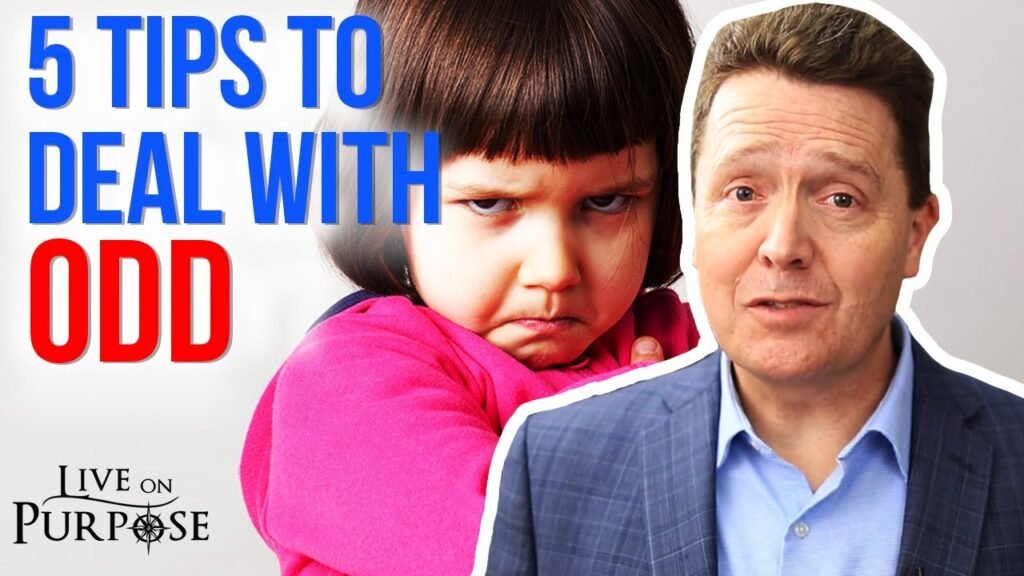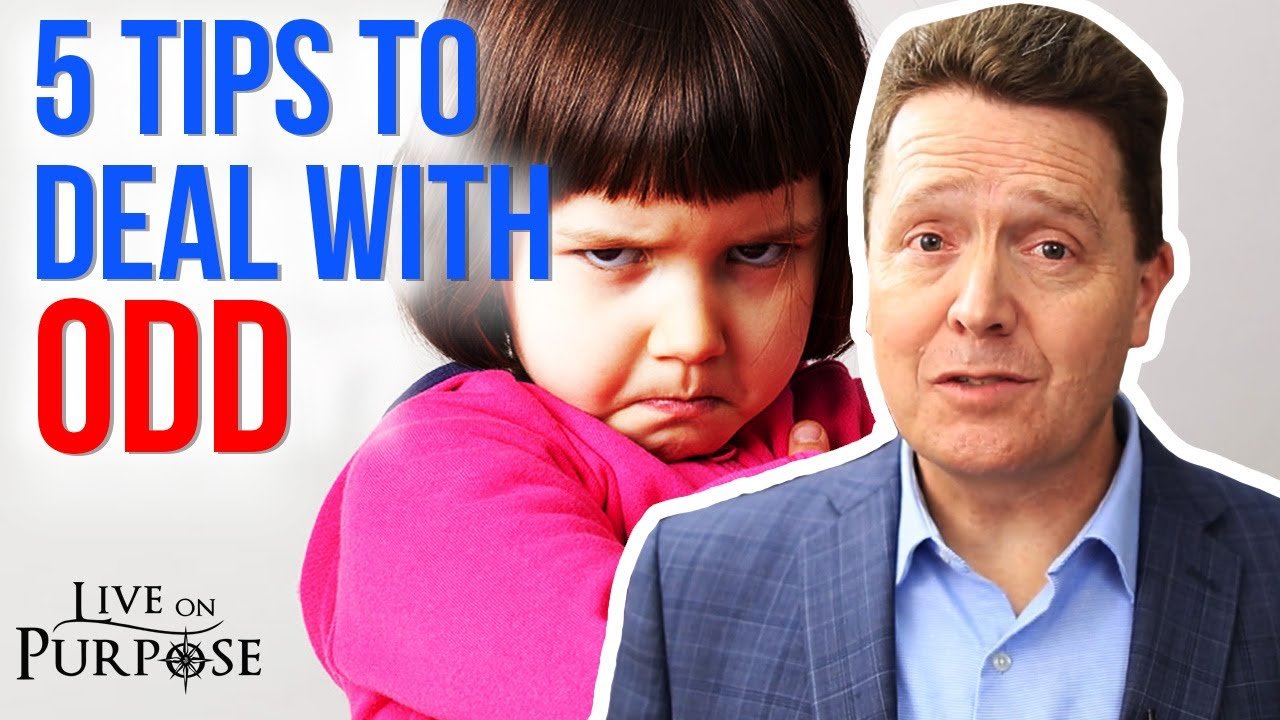Are you a parent dealing with Oppositional Defiant Disorder (ODD) in your child? Well, you’ve come to the right place! In this article, we will explore the reality of ODD as a mental disorder in children and discuss the criteria for diagnosing someone with this condition. We will also provide some effective strategies and tips for dealing with a child with ODD, such as identifying sources of frustration, simplifying family rules, and avoiding power struggles. Additionally, we will emphasize the importance of establishing a positive family culture and being a calm and positive parent. If you’re looking for additional tools and support, we recommend checking out the Parenting Power-Up video by Live On Purpose TV. So, let’s dive in and learn how to effectively deal with a child with ODD!
Dealing with a child who has Oppositional Defiant Disorder (ODD) can be challenging, but it is a real diagnosis listed in the Diagnostic and Statistical Manual of Mental Disorders. In this article, we will walk you through the diagnostic criteria for ODD, including an angry and irritable mood, argumentative behavior, and vindictiveness. We will help you navigate this disorder by providing five practical tips, such as identifying sources of frustration, simplifying family rules, and winning or avoiding power struggles. Additionally, we will highlight the importance of creating a positive family culture and being a calm and positive parent. To further support your journey in dealing with ODD, we recommend checking out the Parenting Power-Up video by Live On Purpose TV. Get ready to equip yourself with effective strategies and techniques to help your child thrive!

Understanding Oppositional Defiant Disorder (ODD)
What is ODD?
Oppositional Defiant Disorder (ODD) is a real mental disorder that affects children. It is included in the Diagnostic and Statistical Manual of Mental Disorders (DSM). ODD is characterized by an angry, irritable mood and argumentative or defiant behavior. To be diagnosed with ODD, the behavior must be more than what is normally expected for a child of that age and must persist for at least six months.
Criteria for diagnosing ODD
The criteria for diagnosing ODD include three components. The first component is an angry, irritable mood, which includes frequently losing temper, being easily annoyed, and feeling angry and resentful. The second component is argumentative and defiant behavior, involving often arguing with authority figures or refusing to comply with requests or rules. The third component is vindictiveness, with a pattern of being spiteful or vindictive towards others.
Differentiating ODD from normal child behavior
When considering a diagnosis of ODD, it is important to distinguish between what is normal or expected behavior for a child of that age versus behavior that is out of the ordinary or more intense than typical. All children may display oppositional or defiant behavior at times, but ODD goes beyond what is considered normal developmentally. Persistence and interference with daily life, education, and relationships are key factors in determining if a child may have ODD.
Identifying Sources of Frustration
Recognizing triggers and patterns
One way to effectively deal with a child with ODD is to identify sources of frustration. Frustration often leads to an increase in anger and defiance, so recognizing triggers and patterns can help address the underlying issues. It is important to be attentive and observe when your child becomes frustrated and determine what might be causing it.
Creating a supportive environment
To support a child with ODD, it is crucial to create a supportive environment at home. This can include providing a safe and structured space, establishing routine and predictability, and offering emotional support. By creating an atmosphere where your child feels understood and supported, you can help reduce their frustration and manage their behavior more effectively.
Addressing underlying issues
In addition to recognizing triggers, it is essential to address any underlying issues that may be contributing to your child’s oppositional and defiant behavior. This may involve seeking professional help from a therapist or counselor who can work with your child to understand and manage their emotions. Identifying and addressing any mental health or emotional issues can significantly improve your child’s behavior and overall well-being.
Simplifying Family Rules
Setting clear and consistent expectations
When dealing with a child with ODD, it is important to set clear and consistent expectations. This means clearly outlining the rules and behavior you expect them to follow. By providing clarity and consistency in your expectations, you are providing structure and stability for your child, which can help reduce oppositional behavior.
Using visual aids and reminders
Visual aids and reminders can be powerful tools for children with ODD. Consider using visual charts, schedules, or checklists to help your child understand and remember the rules and expectations. Visual aids can provide a visual representation of what is expected, making it easier for your child to understand and follow the rules.
Breaking tasks into manageable steps
Complex tasks or instructions can be overwhelming for children with ODD, leading to frustration and defiance. Breaking tasks or instructions into smaller, manageable steps can help your child feel less overwhelmed and increase their chances of success. By providing clear and concise instructions, you are setting your child up for success and reducing the likelihood of oppositional behavior.
Avoiding or Winning Power Struggles
Choosing battles wisely
When dealing with a child with ODD, it is essential to choose your battles wisely. Not every disagreement or issue needs to turn into a power struggle. By prioritizing what is truly important and letting go of minor conflicts, you can avoid unnecessary power struggles and maintain a more positive and calm environment at home.
Using positive reinforcement
Positive reinforcement is a powerful tool when dealing with ODD. Instead of focusing on negative behaviors, reinforce positive behaviors by praising and rewarding your child when they display appropriate behavior. This can help motivate your child to continue behaving positively and reduce oppositional behaviors.
Redirecting negative behavior
Instead of engaging in power struggles or confrontations, try redirecting your child’s negative behavior. By calmly redirecting their attention or offering alternative activities, you can help them refocus their energy in a more positive direction. This redirection can help diffuse tension and prevent the escalation of oppositional behavior.
Establishing a Positive Family Culture
Promoting open communication
Open communication is crucial when dealing with ODD. Encourage your child to express their feelings and concerns in a respectful manner. Create an environment where active listening and open dialogue are valued. By encouraging open communication, you can create a safe space for your child to express themselves without resorting to defiant behavior.
Encouraging problem-solving skills
Teach your child problem-solving skills to help them cope with frustration and conflicts. Encourage them to brainstorm solutions to problems rather than responding with oppositional behavior. By empowering them to find positive solutions, you are helping them develop valuable skills that can improve their behavior and overall well-being.
Modeling positive behavior
As a parent, it is essential to model positive behavior for your child. Children learn by observing and imitating their parents, so demonstrating patience, empathy, and positive coping strategies can have a significant impact on your child’s behavior. By being a positive role model, you are showing your child alternative ways of dealing with frustration and stress.
Being a Calm and Positive Parent
Managing stress and self-care
Dealing with a child with ODD can be challenging and stressful, so it is crucial to prioritize self-care. Take care of your own mental and emotional well-being by engaging in stress-reducing activities, seeking support from friends or support groups, and practicing self-care routines. By managing your stress and prioritizing your well-being, you are better equipped to handle challenging situations with your child.
Practicing patience and empathy
When dealing with oppositional and defiant behavior, it is important to practice patience and empathy. Try to understand your child’s perspective and recognize that their behavior may be a manifestation of underlying emotions or frustrations. By approaching them with empathy and patience, you can diffuse tense situations and find more productive ways to address their needs.
Using effective discipline techniques
Discipline is an essential aspect of parenting, but it is crucial to use effective and age-appropriate discipline techniques when dealing with ODD. Avoid punitive measures and instead focus on positive reinforcement, clear boundaries, and logical consequences. By providing consistent and appropriate discipline, you can help your child understand the impact of their behavior while maintaining a positive and supportive environment.
Seeking Additional Support and Resources
Understanding the importance of professional help
If you are struggling to manage your child’s ODD behaviors, it is important to seek professional help. A therapist or counselor specializing in child behavior can provide valuable insights and strategies for effectively managing ODD. They can also offer support and guidance to you and your family as you navigate this challenging journey.
Joining support groups or therapy
Joining support groups or attending therapy sessions specifically designed for parents of children with ODD can be incredibly beneficial. These forums offer a safe space to share experiences, exchange coping strategies, and gain support from individuals who understand the unique challenges of dealing with ODD. Connecting with others in similar situations can provide a sense of community and empowerment.
Exploring the Parenting Power-Up program
The Parenting Power-Up program is a valuable resource for parents dealing with ODD. This program offers tools, strategies, and support specifically tailored to help parents effectively manage their child’s oppositional and defiant behavior. By enrolling in this program, you can access valuable resources and guidance to support you in your journey as a parent of a child with ODD.
Dealing with a child with Oppositional Defiant Disorder can be challenging, but with patience, understanding, and the implementation of effective strategies, you can create a positive and supportive environment for your child. Remember to prioritize self-care and seek professional support when needed. Together, you can navigate this journey and help your child thrive.

